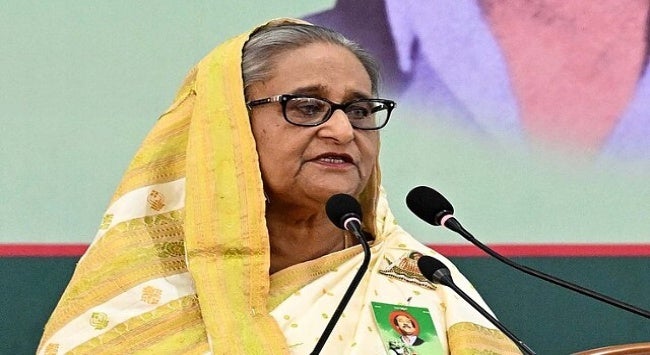The Hasina Verdict and the Extradition:
Implications for Dhaka-Delhi Relations
Amit Ranjan
20 November 2025Summary
On 17 November 2025, the International Crimes Tribunal sentenced Bangladesh’s former Prime Minister Sheikh Hasina to death for crimes against humanity. The challenge for Dhaka is how it will execute the judgement. Hasina is in India which is yet to comply on Bangladesh’s earlier request to extradite her.
On 17 November 2025, a three-member bench of the International Crimes Tribunal (ICT) sentenced Bangladesh’s former Prime Minister Sheikh Hasina to death. She was convicted on three counts: incitement, ordering killings and failing to prevent atrocities during the student protests of 2024. The tribunal also handed the death sentence to former Home Minister Asaduzzaman Khan Kamal, while Chowdhury Abdullah Al-Mamun, the former Inspector General of Police who turned state witness, was sentenced to five years in prison.
Reacting to the ICT decision from New Delhi, Hasina said, “The verdicts announced against me have been made by a rigged tribunal established and presided over by an unelected government with no democratic mandate”, adding that “they are biased and politically motivated.” While the United Nations Human Rights Office of the High Commissioner called the verdict “…an important moment for victims of the grave violations committed during the suppression of protests last year”, it “regret[ted] the imposition of the death penalty” which it opposed “in all circumstances”. Similarly, Meenakshi Ganguly, Deputy Asia Director of Human Rights Watch, an international organisation, said, “There is enduring anger and anguish in Bangladesh over Hasina’s repressive rule, but all criminal proceedings need to meet international fair trial standards”. A British investigative journalist, David Bergman, who had earlier questioned the Awami League’s number of three million Bangladeshis killed during the 1971 war and was punished by the ICT set up by Hasina’s government in December 2014, in his opinion piece, observed that the nature of trial in-absentia is problematic. Although the state/tribunal appointed a defence lawyer, Amir Hossain, he had no experience in international criminal law. He was also working in a hostile environment and failed to make even basic arguments in Hasina’s defence. On the contrary, there are individuals – besides members of the government and political parties – in Bangladesh who termed the verdict “historic”.
Apart from fairness of process, a key question is Bangladesh’s ability to execute the ICT’s decision since Hasina has been living in New Delhi since she was forced to flee Dhaka in August 2024. At the end of last year, Bangladesh had made a formal request to India to extradite Hasina but she has remained in India. Following the recent judgement, Bangladesh’s Foreign Affairs Adviser Md Touhid Hossain stated, “We will officially communicate our position to India…Now the situation is different…The judicial process has been completed and they have been convicted”. A Bangladesh foreign ministry statement has “…urged New Delhi to immediately hand over” Hasina and Kamal whose transfer is “a compulsory responsibility for New Delhi”. It further stated that “granting shelter to individuals convicted of crimes against humanity would be considered an unfriendly act and a disregard for justice”. Prosecutor Gazi Monawar Hossain Tamim said that the ICT is also preparing to request for assistance from Interpol through Bangladesh’s foreign ministry to repatriate Hasina and Kamal.
Many members of the Awami League living in India are ready to return if there is “political inclusion” and they expect New Delhi to continue giving shelter to Hasina with “honour” and “security”. In an initial reaction on the ICT verdict, India stated that it has “noted the verdict” and “remains committed to the best interests of the people of Bangladesh, including in peace, democracy, inclusion and stability in that country. We will always engage constructively with all stakeholders to that end”.
India and Bangladesh signed an extradition treaty in 2013. Under the treaty, they agreed to hand over criminals taking shelter in their territory after committing a crime in the other country. However, under Article 6 (1) of the treaty, “Extradition may be refused if the offence of which it is requested is an offence of a political character”. Then, under Article 8 (III), a person may not be extradited if “the accusation against him [has not been] made in good faith in the interests of justice”. In July 2016, India and Bangladesh signed an agreement to amend Article 10 (3) of the extradition treaty to facilitate the expeditious extradition of fugitive criminals.
In Hasina’s case, India could contend that the judicial process lacked credibility, that the charges were not brought in good faith and that the verdict was politically motivated. Under Section 29 of an Indian Extradition Act, 1962, New Delhi may refuse an extradition request if it appears to be trivial, made in bad faith, driven by political considerations or contrary to the interests of justice. Should India choose not to extradite Hasina, it must be prepared for Dhaka to escalate the issue in international forums and potentially seek support from international organisations to press for her return.
Politically, India’s relations with Bangladesh under the interim government in Dhaka have been less than cordial. As a result, New Delhi may choose to buy time and address the Hasina dilemma once a fully elected government takes office in Dhaka after next year’s polls. While articulating its stance on Hasina through the lenses of rationality, prudence and long-standing friendship with her, India must also carefully consider how its choices could further widen the political gap between the two capitals and what the broader implications might be for regional geopolitics.
. . . . .
Dr Amit Ranjan is a Research Fellow at the Institute of South Asian Studies (ISAS), an autonomous research institute at the National University of Singapore (NUS). He can be contacted at isasar@nus.edu.sg. The author bears full responsibility for the facts cited and opinions expressed in this paper.
Pic Credit: Wikimedia Commons
-
 More From :
More From :
-
 Tags :
Tags :
-
 Download PDF
Download PDF



